This article needs additional citations for verification .(March 2012) |

The Double Dealer is a comic play written by English playwright William Congreve, first produced in 1693. [1] [2] Incidental music for the play was written by Henry Purcell.
This article needs additional citations for verification .(March 2012) |

The Double Dealer is a comic play written by English playwright William Congreve, first produced in 1693. [1] [2] Incidental music for the play was written by Henry Purcell.
This comedy sees character Mellefont, nephew and prospective heir of Lord Touchwood, about to marry Cynthia, daughter of Sir Paul Plyant. Lady Touchwood, a violent and dissolute woman, is in love with Mellefont, but as he rejects her advances, determines to prevent the match and ruin him in Lord Touchwood's esteem. In this design she finds a confederate in Maskwell, the Double Dealer, who has been her lover, pretends to be Mellefont's friend, and aspires to cheat him of Cynthia and get her for himself. To this end he leads Plyant to suspect an intrigue between Mellefont and Lady Plyant, and Touchwood an intrigue between Mellefont and Lady Touchwood; and contrives that Touchwood shall find Mellefont in the latter's chamber. [3]
Mellefont is disinherited and Cynthia is to be made over to Maskwell. The latter's plot, however, here goes wrong. Lord Touchwood informs Lady Touchwood of Maskwell's intention to marry Cynthia. This awakens her jealousy. She finds Maskwell and rebukes him, and is overheard by Lord Touchwood, who now perceives Maskwell's treachery, and defeats his final attempt to carry off Cynthia. [4]
On 14 May 1995, BBC Radio 3 broadcast a production directed by Phyllida Lloyd and featuring Robin Bailey as Lord Touchwood, Sheila Gish as Lady Touchwood, Jonathan Cullen as Mellefont, Clive Swift as Sir Paul Plyant, Penelope Wilton as Lady Plyant, Christopher Benjamin as Lord Froth, Celia Imrie as Lady Froth, Claire Skinner as Cynthia, Mark Lockyer as Brisk, Richard Bonneville as Careless and Robert Glenister as Maskwell.
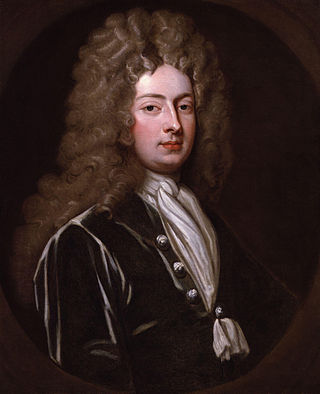
William Congreve was an English playwright, poet and Whig politician. His works, which form an important component of Restoration literature, were known for their use of satire and the comedy of manners genre. Notable plays he wrote include The Old Bachelor (1693), The Double Dealer (1694), Love for Love (1695), The Mourning Bride (1697) and The Way of the World (1700). Dying in London, Congreve was buried at the Poets' Corner in Westminster Abbey.
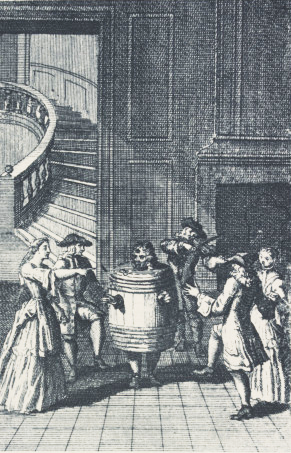
"Restoration comedy" is English comedy written and performed in the Restoration period of 1660–1710. Comedy of manners is used as a synonym for this. After public stage performances were banned for 18 years by the Puritan regime, reopening of the theatres in 1660 marked a renaissance of English drama. Sexually explicit language was encouraged by King Charles II (1660–1685) personally and by the rakish style of his court. Historian George Norman Clark argues:
The best-known fact about the Restoration drama is that it is immoral. The dramatists did not criticize the accepted morality about gambling, drink, love, and pleasure generally, or try, like the dramatists of our own time, to work out their own view of character and conduct. What they did was, according to their respective inclinations, to mock at all restraints. Some were gross, others delicately improper.... The dramatists did not merely say anything they liked: they also intended to glory in it and to shock those who did not like it.

The Country Wife is a Restoration comedy written by William Wycherley and first performed in 1675. A product of the tolerant early Restoration period, the play reflects an aristocratic and anti-Puritan ideology, and was controversial for its sexual explicitness even in its own time. The title contains a lewd pun with regard to the first syllable of "country". It is based on several plays by Molière, with added features that 1670s London audiences demanded: colloquial prose dialogue in place of Molière's verse, a complicated, fast-paced plot tangle, and many sex jokes. It turns on two indelicate plot devices: a rake's trick of pretending impotence to safely have clandestine affairs with married women, and the arrival in London of an inexperienced young "country wife", with her discovery of the joys of town life, especially the fascinating London men. The implied condition the Rake, Horner, claimed to suffer from was, he said, contracted in France whilst "dealing with common women". The only cure was to have a surgeon drastically reduce the extent of his manly stature; therefore, he could be no threat to any man's wife.
This article contains information about the literary events and publications of 1693.

The School for Scandal is a comedy of manners written by Richard Brinsley Sheridan. It was first performed in London at Drury Lane Theatre on 8 May 1777.
Sir George Etherege was an English dramatist. He wrote the plays The Comical Revenge or, Love in a Tub in 1664, She Would If She Could in 1668, and The Man of Mode or, Sir Fopling Flutter in 1676.

In March 1698, Jeremy Collier published his anti-theatre pamphlet, A Short View of the Immorality and Profaneness of the English Stage; in the pamphlet, Collier attacks a number of playwrights: William Wycherley, John Dryden, William Congreve, John Vanbrugh, and Thomas D'Urfey. Collier attacks rather recent, rather popular comedies from the London stage; he accuses the playwrights of profanity, blasphemy, indecency, and undermining public morality through the sympathetic depiction of vice.

The Way of the World is a play written by the English playwright William Congreve. It premiered in early March 1700 in the theatre in Lincoln's Inn Fields in London. It is widely regarded as one of the best Restoration comedies and is still occasionally performed. Initially, however, the play struck many audience members as continuing the "immorality" of the previous decades, and was not well received.

A Chaste Maid in Cheapside is a city comedy written c. 1613 by the English Renaissance playwright Thomas Middleton. Unpublished until 1630, and long-neglected afterwards, it is now considered among the best and most characteristic Jacobean comedies.
Epicœne, or The Silent Woman, also known as Epicene, is a comedy by Renaissance playwright Ben Jonson. The play is about a man named Dauphine, who creates a scheme to get his inheritance from his uncle Morose. The plan involves setting Morose up to marry Epicoene, a boy disguised as a woman. It was originally performed by the Blackfriars Children, or Children of the Queen's Revels, a group of boy players, in 1609. Excluding its two prologues, the play is written entirely in prose.
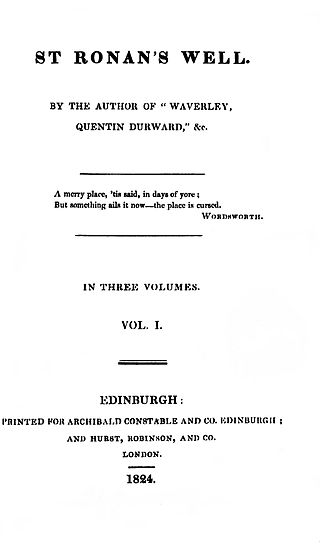
Saint Ronan's Well is one of the Waverley novels by Sir Walter Scott. Set in a fashionable spa in the Scottish Borders, it is the only novel he wrote with a 19th-century setting.
A Mad Couple Well-Match'd is a Caroline era stage play, a comedy written by Richard Brome. It was first published in the 1653 Brome collection Five New Plays, issued by the booksellers Humphrey Moseley, Richard Marriot, and Thomas Dring.
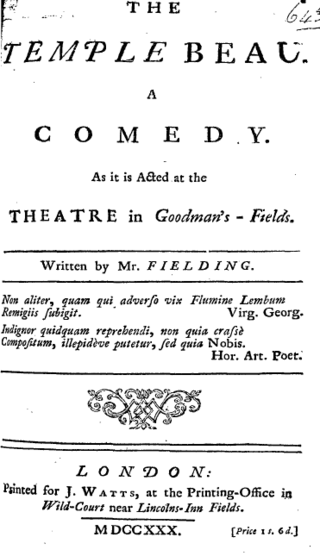
The Temple Beau is a play by Henry Fielding. It was first performed on 26 January 1730, at Goodman's Fields after it was rejected by the Theatre Royal. The play, well received at Goodman's Fields, depicts a young law student forsaking his studies for pleasure. By portraying hypocrisy in a comedic manner, Fielding shifts his focus from a discussion of love and lovers.

Cave Underhill (1634–1710?) was an English actor in comedy roles.

Maria Theresa Kemble (1774–1838), née Marie Thérèse Du Camp, was an Austrian-born English actress, singer, dancer and comic playwright on the stage. She was the wife of actor Charles Kemble.

Love for Love is a Restoration comedy written by English playwright William Congreve. It premiered on 30 April 1695 at the Lincoln's Inn Fields Theatre. Staged by Thomas Betterton's company the original cast included Betterton as Valentine, William Smith as Scandal, John Bowman as Tattle, Thomas Doggett as Ben, Samuel Sandford as Foresight, William Bowen as Jeremy, John Freeman as Buckram, Anne Bracegirdle as Angelica, Elizabeth Bowman as Mrs Foresight, Elizabeth Barry as Mrs Frail, Elinor Leigh as Nurse and Abigail Lawson as Jenny.
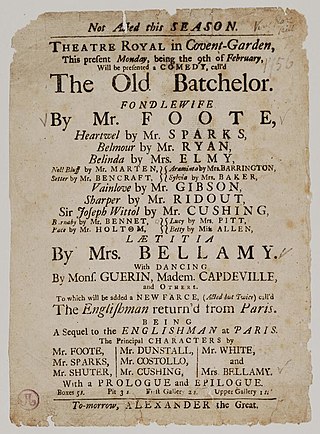
The Old Bachelor is the first play written by British playwright William Congreve, produced in 1693. Incidental music for the play was written by Henry Purcell. Originally staged by the United Company at the Theatre Royal, Drury Lane the cast included Thomas Betterton as Heartwell, George Powell as Bellmour, Joseph Williams as Vainlove, William Bowen as Sir Joseph, Joseph Haines as Bluff, Thomas Doggett as Fondlewife, Cave Underhill as Servant, Anne Bracegirdle as Araminta, Susanna Mountfort as Belinda, Elizabeth Barry as Laetitia, Elizabeth Bowman as Sylvia, Elinor Leigh as Lucy.
Touchwood is decayed wood used for tinder. The phrase "touch wood" is another way of describing knocking on wood. The terms may also refer to:
Joseph Williams was an English stage actor of the seventeenth and early eighteenth century.
Elinor Leigh was a British stage actor of the seventeenth century.